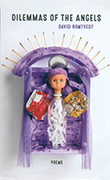Dilemmas of the Angels
Publisher: LSU Press
Purchase
In
the series of poems that underpines this collection, Romtvedt imagines the daily lives of angels as well as other, more earthly, concerns.
Selections from Dilemmas of the Angels
Surprise Breakfast
One winter morning I get up early
to clean the ash from the grate
and find my daughter, eight, in the kitchen
thumping around pretending she has a peg leg
while also breaking eggs into a bowl-
separating yolks and whites, mixing oil
and milk. Her hands are smooth,
not from lack of labor but youth.
She's making pancakes for me, a surprise
I have accidentally ruined. "You never
get up early," she says, measuring
the baking powder, beating the egg whites.
It's true. When I wake, I roll to the side
and pull the covers over my head.
"It was too cold to sleep," I say.
"I thought I'd get the kitchen warm."
Aside from the scraping of the small, flat shovel
on the iron grate, and the wooden spoon turning
in the bowl, the room is quiet. I lift the gray ash
and lay it carefully into a bucket and take it outside.
"How'd you lose your leg?" I ask.
"At sea. I fell overboard in a storm
and a shark attacked me, but I'm fine."
She spins, a little batter flying from the spoon.
I can hear the popping of the oil in the pan.
"Are you ready?" she asks, thumping to the stove.
Fork in hand, I sit down, hoping that yes,
I am ready, or nearly so, or one day will be.
Western Aid
We worked in the East African hill country
running a parasite dipping tank. Local farmers
brought their cows and goats twice a week
and the animals were led into an ever narrowing chute
until they were forced to walk single file
to the lip of a concrete tank filled with pesticide.
They balked and bellowed, and tried to turn.
Their feet slipped out from under them
on the oozing carpet of urine and excrement
left by those who'd gone ahead.
Finally, they fell into the pesticide-laden water
and swam for their lives. At the far end of the tank
the bottom sloped up and the terrified animals
stumbled back onto land where they shook
and ran then stopped to lick themselves.
One morning a patrol appeared. The soldiers
had removed the mirrors from the front fenders
of their Jeep and, on the vertical steel supports,
had mounted the heads of captured rebels
they were fond of calling communists.
"Vous n'en avez pas?" Ambiguous,
the question might have pertained
to medicines, gasoline, canned milk,
or rebels disguised as starving farmers.
"Nous ne carchons rien," my coworker said.
"We are hiding nothing," then pointed at the head
and added, "c'est pas juste." "It's not right."
The Jeep driver stepped forward
and poked the barrel of his rifle
into her chest. I heard the quick
inhalation as he flipped the weapon
and then, swinging it two-handed
like a tennis player from another era,
knocked her down. When she didn't rise,
he moved to strike her again. A second
soldier held him back and they left,
heads wobbling on their mounts.
